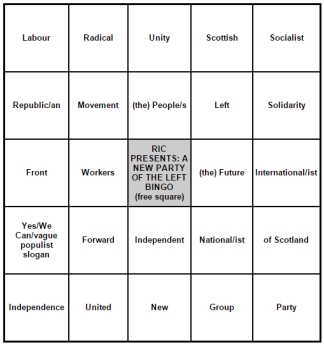Some thoughts by one of our members on the SNP in light of the recent election results. You can also read another member’s response here.
The leadership of the SNP must be the happiest people with the recent election results outside of the Tory front bench. Everything has lined up perfectly for them. But why would I say this when the polls were strongly hinting that the SNP could have been part of a coalition government and forced more devolved powers to Scotland? Surely they have missed out on making things better for the working classes here in Scotland?
The SNP as a political party doesn’t have the goal of making things “fairer” or to look out for us. That is the rhetoric of any opposition party the world over, and it is used to build membership and support. Once in power the SNP would get on with the same job that every government has, running the state to protect the capitalist interests of a specific segment of the ruling class while also keeping capitalism in check so it doesn’t all fall apart. At the moment that means implementing austerity and progressing the privatisation of public services; the working class will always be hard done-by.
The puzzle for the SNP is that the segment of capitalist interest they fight would benefit most from independence. If they were seen to be helping run Britain then they would have a harder time looking out for their own interests. By missing out on coalition they also miss out on the LibDem problem of being a supporting part of whatever cuts the government were making. However, would the same fate awaited them as hit the LibDems, that of rapidly destroying their base of support? Not quite, but kinda.
The twist here in Scotland is that the SNP can always play the Westminster card, and they do, time-and-time-again. If something goes wrong, no matter what, it is down to London (or Tories or some other boogieman) and the solution is independence. It doesn’t matter that the horrendous attack on working class services by Edinburgh council are SNP led, or that they have clearly shown that they have no intention of scrapping Trident as they intend to remain in NATO, or even that a whole host of their white paper promises are for things already devolved to Holyrood. These are not the failings of the SNP, liberal democracy, or a capitalist system. Nope. It is all Westminster.
The problem for the SNP is that to keep voters on-side for now they need to be seen to be centre-left. This means giving us in the working class just enough concessions to make things look like they are trying their best until they can secure independence and then get on with looking out for their interests in the way they want to. The less the SNP have obvious control over the better they look. If powers are devolved slowly, bit-by-bit, then they would either have to concede more and harm their interests or it would become clearer that they are just the same as any other party.
So for the SNP having a Conservative majority is perfect: they can fight and lose to them and look great while awaiting another referendum, and at the same time any flack can be avoided by saying the Tory’s are the cause and that the failure to provide opposition was the failure of the Labour Party in England.
My other thought on the SNP landslide is that it stands as another landmark point in the furthering of nationalist views in Scotland. The role of nationalism is to hide the struggle between ruling class and working class, having us in the working class to support actions that prop up a part of the ruling class rather than work on understanding our own interests and fighting to have our lot improved. Now the main narrative is that things will be made better if we get behind independence, something which has no guarantees and diverts us from taking part in grassroots struggles where we can make a marked improvement in our lives.
At the same time we can look at the voting figures in England and get a rough feeling over why people voted a certain way. On the other hand it is far more difficult to judge up here in Scotland, where the SNP present themselves as whatever will be popular in the area (so centre-left in Glasgow and centre-right almost everywhere else). Add to this the feeling of disappointment over the lack of change post-referendum and it becomes impossible to get a measure for the views of the SNP voter base. My feeling is that this time around most of their voters want a better society and some real change, but that they have been set-up for future disappointment as the SNP fulfils it’s role as a part of the machinery of a neo-liberal social democracy.
So, if it is just a case that the yellow tories are in, what should we be doing? I’ll be putting up a post in the next few days with some more hopeful and proactive thoughts on that topic.




.JPG)
 A Glasgow anarchist’s take on Scottish independence
A Glasgow anarchist’s take on Scottish independence